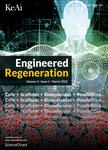Engineering advanced dynamic biomaterials to optimize adoptive T-cell immunotherapy
作者机构:Department of BioengineeringImperial College LondonLondon SW72AZUnited Kingdom Department of Biomedical EngineeringThe Hong Kong Polytechnic UniversityKowloonHong KongChina School of Biomedical SciencesThe Chinese University of Hong KongShatinHong KongChina
出 版 物:《Engineered Regeneration》 (再生工程(英文))
年 卷 期:2021年第2卷第1期
页 面:70-81页
核心收录:
学科分类:1001[医学-基础医学(可授医学、理学学位)] 10[医学]
基 金:the start-up funding(A0033912)from the Department of Biomedical Engineering Start-up Fund for RAPs under the Strategic Hiring Scheme(0035876) the Hong Kong Polytechnic University(University Grant Council),for supporting this work
主 题:T-cell mechanobiology Dynamic nanobiomaterials Adoptive T-cell immunotherapy T-Ligand presentation
摘 要:Adoptive T-cell therapy(ACT)is a promising therapeutic approach based on the concept of potent T-cell mediated immunity against the *** outcome of antigen-specific T-cells responses relies on the interaction between T-cells and antigen-presenting cells,which provides signals for generating different T-cell phenotypes with different roles in tumor ***,such interaction is often not optimal in vivo and results in low therapeutic *** reach the full potential of the T-cell response,current research put effort into developing dynamic biomaterials as artificial antigen-presenting cells to study and regulate the T-cell activity for controlling T-cell *** this perspective,we provide(1)an overview of ACT and general T-cells behaviors,(2)explore the insight on how biomaterials can be used for studying and regulating T-cell behaviors,(3)and discuss conceptual gaps in knowledge for biomaterials-based immunotherapy.



